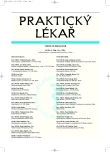-
Medical journals
- Career
Chronic renal failure in primary care
Authors: V. Teplan
Authors‘ workplace: Subkatedra nefrologie IPVZ, Praha ; Přednosta: prof. MUDr. Vladimír Teplan, DrSc. ; Klinika nefrologie, Transplantcentrum IKEM, Praha
Published in: Prakt. Lék. 2007; 87(1): 4-10
Category: Reviews
Overview
The prevalence of patients with chronic renal failure treated by one method of renal function replacement is steadily rising. Nowadays, the most frequent cause of renal failure is diabetic nephropathy and nephrosclerosis. Haemodialysis treatment is very expensive, in general the treatment of 0.1–0.2% of the population consumes 4–7% of the total health care expenditure. In comparison with non-dialyzed renal failure patients, the quality of life of dialyzed patients is substantially lower. Mortality of patients with end-stage renal disease treated by haemodialysis remains very high: 20–25% per year. The yearly mortality of patients after successful kidney transplantation is markedly lower than in haemodialyzed patients (cca 10 times), however their mortality remains significantly higher than in the age-matched population.
At present we have scarce information about mortality and risk of development of a haemodialysis requiring end-stage renal disease in a homogenous unselected population of patients with advanced renal failure. Data available refer to patients from randomized clinical trials which represent a selected population with a probably lower incidence of co-morbidities than usual, and thus with a better prognosis. A conservative treatment aims to control metabolic disturbances associated with an impaired renal function, and to postpone commencement of haemodialysis treatment in certain cases.Key words:
renal failure, end-stage renal disease, therapeutic modalities
Labels
General practitioner for children and adolescents General practitioner for adults
Article was published inGeneral Practitioner

2007 Issue 1-
All articles in this issue
- Patent foramen ovale as a cause of paradoxical embolization in scuba divers. Screening possibilities, therapeutic and preventive recommendation.
- Hypoglycaemia-associated autonomic failure, its clinical assessment and treatment.
- Chronic renal failure in primary care
- Prescription of psychotropic drugs during pregnancy and breast-feeding in the general practitioner’s surgery.
- Wilson’s disease
- Diagnostics and treatment of rheumatoid arthritis – some new aspects
- Biochemical molecular mechanisms of heart failure (Part 2)
- Antimicrobial resistance in seven invasive bacterial species* monitored within EARSS in the Czech Republic (CR) from 2000 – 2006. (*Streptococcus pneumoniae, Staphylococcus aureus, Enterococcus faecalis, Enterococcus faecium, Escherichia coli, Klebsiella pneumoniae, Pseudomonas aeruginosa).
- Childhood injuries and their prevention
- Our experience with the treatment of acute mesenterial ischemia
- Craniopharyngioma in 79 years old man – a case study
- General Practitioner
- Journal archive
- Current issue
- Online only
- About the journal
Most read in this issue- Chronic renal failure in primary care
- Craniopharyngioma in 79 years old man – a case study
- Wilson’s disease
- Hypoglycaemia-associated autonomic failure, its clinical assessment and treatment.
Login#ADS_BOTTOM_SCRIPTS#Forgotten passwordEnter the email address that you registered with. We will send you instructions on how to set a new password.
- Career

